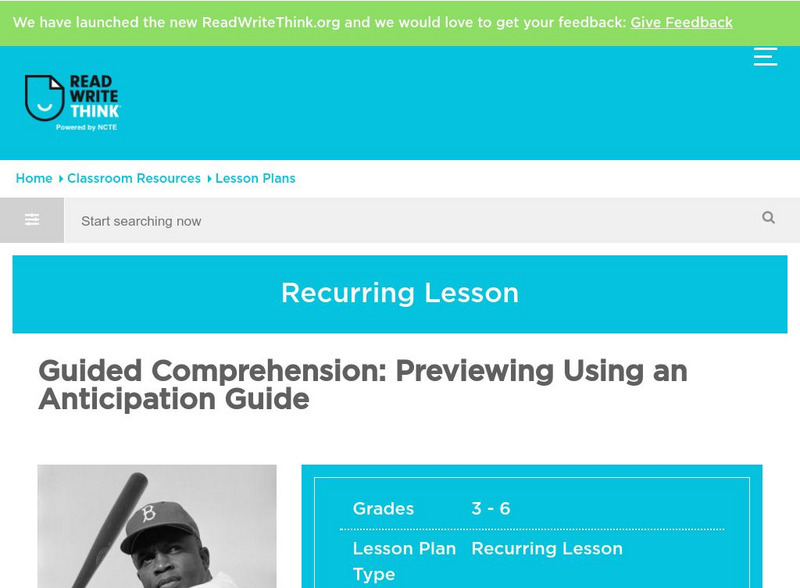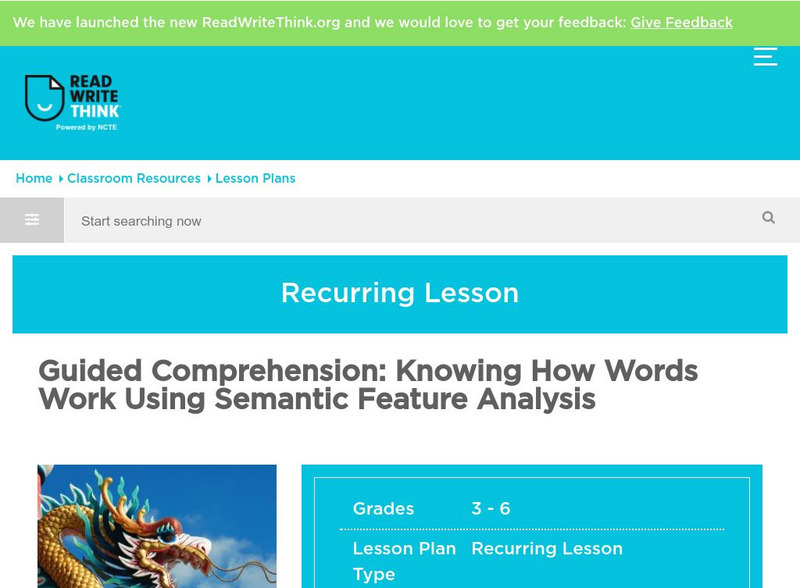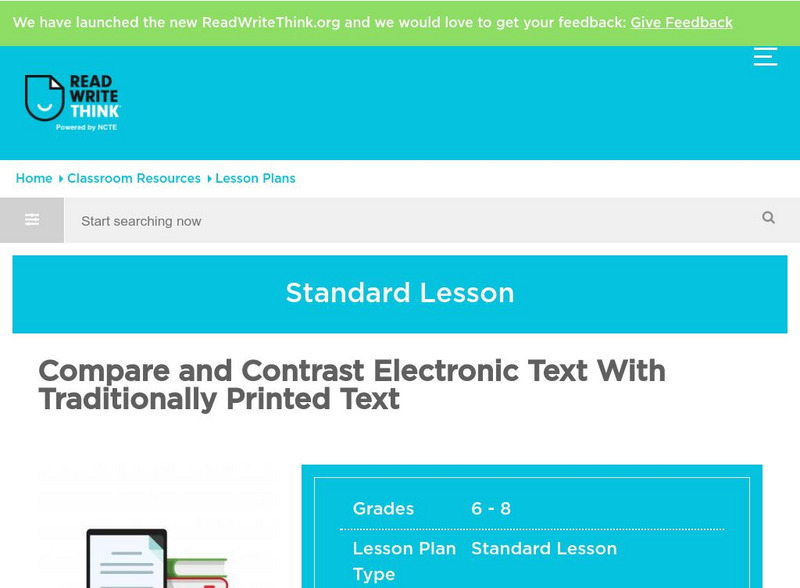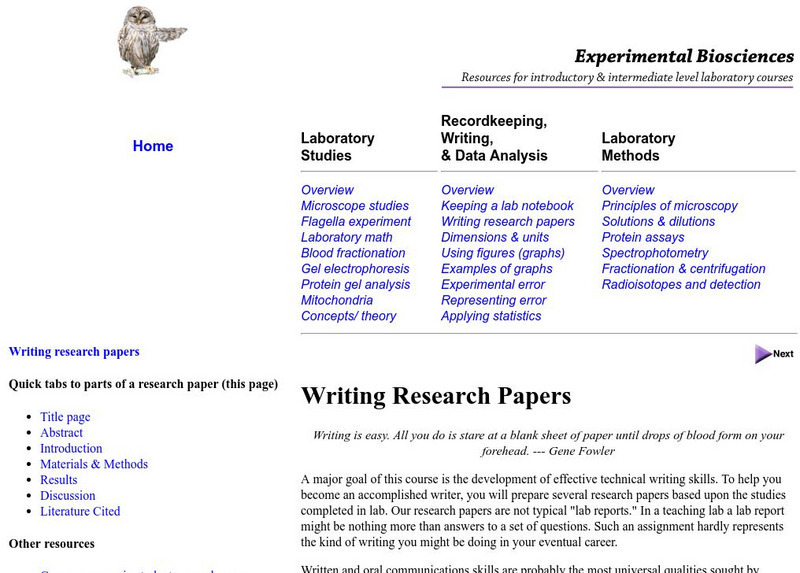Better Lesson
Better Lesson: Analyzing Text Complexity of Non Fiction Sources
This lesson plan will help young scholars read and comprehend nonfiction, specifically biographies, through determining criteria for text complexity. Included is a PDF and Smart Notebook titled Determining Text Complexity, and an example...
AdLit
Ad lit.org: Classroom Strategies: Inferential Reading
Teaching students to "read influentially" helps them learn how to read more strategically. This technique is derived from the teaching model that learners develop knowledge via the process of interpreting new information in light of past...
AdLit
Ad lit.org: Explicit Comprehension Strategy Instruction
Use explicit strategy instruction to make visible the invisible comprehension strategies that good readers use to understand text. Support students until they can use the strategies independently. Recycle and re-teach strategies...
AdLit
Ad lit.org: Extended Discussion of Text Meaning and Interpretation
Teachers should provide opportunities for students to engage in high-quality discussions of the meaning and interpretation of texts in various content areas as one important way to improve their reading comprehension.
AdLit
Ad lit.org: Content Area Literacy: Science
The demands of comprehending scientific text are discipline specific and are best learned by supporting students in learning how to read a wide range of scientific genres. Besides text structures emphasizing cause and effect, sequencing...
Curated OER
Mc Graw Hill: Part 2 Reading: Informational Text: Evaluate Arguments and Claims
This article will help you evaluate informational text to determine whether an author's argument is supported by evidence or not. Click on Model to see a model with explanations and then click on Practice.
Polk Brothers Foundation Center for Urban Education at DePaul University
De Paul University: Center for Urban Education: I Can Infer Character Traits and Support [Pdf]
Students can use this graphic organizer while making inferences about characters in a story or history text. Students will collect text evidence in the chart to support their character trait inferences.
ReadWriteThink
Read Write Think: Guided Comprehension: Previewing
This lesson introduces students to the comprehension technique of previewing. Students use anticipation guides to preview and predict stories and work in small groups.
ReadWriteThink
Read Write Think: Guided Comprehension: Making Connections
Lesson introduces students to the strategy of making connections. Students learn the three types of connections using a double-entry journal. A good resource for teachers.
ReadWriteThink
Read Write Think: Guided Comprehension: Semantic Analysis
Lesson introduces students to comprehension of knowing how words work. Students learn semantic feature analysis and examine folktales, myths, and fables using this analysis to better understand these terms and texts.
Other
English Companion: Reading Expository Text
Taken from "Reading Reminders: Tools, Tips, and Techmiques," the information on this website provides advice on how to read, understand, analyze, and write expository texts.
Austin Independent School District
Austin Independent School: 10 Major Types of Inference in Literature [Pdf]
This printable activity helps students recognize the difference between an implication and an inference. Students are presented with quotes from the text and they practice with each of the ten types of inference: location, agent, time,...
International Reading Association
Reading Online Articles: Comprehension Instruction
An article on improving reading comprehension through time-tested strategies as well as a summary of new hypotheses about effective comprehension instruction.
ReadWriteThink
Read Write Think: Guided Comprehension: Summarizing
Lesson that introduces students to the comprehension technique of summarizing. Students learn using the QuIP (questions into paragraphs) method which involves organizing information and putting it in writing.
Sophia Learning
Sophia: Supporting Details: Facts and Statistics
This lesson discusses how statistics can be used as supporting details. This tutorial shares a short audio lesson [05:16] and supplemental notes with the lesson's content.
E Reading Worksheets
E Reading Worksheets: Making Predictions Worksheets and Lessons
In this learning module, students will learn more about making predictions in reading. Worksheets and a leson are provided to support Tier I, Tier II, and Tier III students.
ReadWriteThink
Read Write Think: Compare/contrast Electronic Text With Traditionally Printed Text
Lesson allows for middle school learners who are familiar with researching electronic sources to gain a deeper understanding of the benefits of online resources versus traditional print.
Polk Brothers Foundation Center for Urban Education at DePaul University
Depaul University: Center for Urban Education: Inference Organizer [Pdf]
Students will use a graphic organizer to help them make inferences. Students will list the literal text evidence and make an educated guess based on the text evidence.
Polk Brothers Foundation Center for Urban Education at DePaul University
Depaul University: Center for Urban Education: I Can Explain an Inference [Pdf]
This tool can be used to help students articulate their answers about fiction pieces. Students will quote the text, provide an inference, and give a justification.
Curated OER
Mc Graw Hill: 6th Grade Use Text Evidence
Learn how to use text evidence to draw inferences; click the Model button on bottom right.
Rice University
Rice University: Writing Research Papers
This site presents information about the necessary parts of a scientific research report. It also contains a sample abstract and introduction.
E Reading Worksheets
E Reading Worksheets: Inferences Worksheets
In this learning module, students will learn more about making inferences. Worksheets are provided to reinforce the skill of making inferences. This module is designed to support Tier I, Tier II, and Tier III students.
CommonLit
Common Lit: Ataka
CommonLit.org is a wonderful resource to use in a Language Arts classroom. Each story or article is accompanied by guided reading questions, assessment questions, and discussion questions. In addition, students can click on words to see...
Learning Farm
Learning Farm: Word Relationships
Learn how word relationships affect the meaning of text, and then practice this skill.






![De Paul University: Center for Urban Education: I Can Infer Character Traits and Support [Pdf] Graphic De Paul University: Center for Urban Education: I Can Infer Character Traits and Support [Pdf] Graphic](https://static.lp.lexp.cloud/images/attachment_defaults/resource/large/FPO-knovation.png)








